| PureLandMountain.com |

Site Feed 

The Blog Brothers
Talk on the Wild Side 
Sushi passing
04/01/2002 - 04/30/2002
05/01/2002 - 05/31/2002
06/01/2002 - 06/30/2002
07/01/2002 - 07/31/2002
08/01/2002 - 08/31/2002
09/01/2002 - 09/30/2002
10/01/2002 - 10/31/2002
11/01/2002 - 11/30/2002
12/01/2002 - 12/31/2002
01/01/2003 - 01/31/2003
02/01/2003 - 02/28/2003
03/01/2003 - 03/31/2003
04/01/2003 - 04/30/2003
05/01/2003 - 05/31/2003
06/01/2003 - 06/30/2003
07/01/2003 - 07/31/2003
08/01/2003 - 08/31/2003
09/01/2003 - 09/30/2003
10/01/2003 - 10/31/2003
11/01/2003 - 11/30/2003
12/01/2003 - 12/31/2003
01/01/2004 - 01/31/2004
02/01/2004 - 02/29/2004
03/01/2004 - 03/31/2004
04/01/2004 - 04/30/2004
05/01/2004 - 05/31/2004
06/01/2004 - 06/30/2004
07/01/2004 - 07/31/2004
08/01/2004 - 08/31/2004
09/01/2004 - 09/30/2004
10/01/2004 - 10/31/2004
11/01/2004 - 11/30/2004
12/01/2004 - 12/31/2004
01/01/2005 - 01/31/2005
02/01/2005 - 02/28/2005
03/01/2005 - 03/31/2005
04/01/2005 - 04/30/2005
05/01/2005 - 05/31/2005
06/01/2005 - 06/30/2005
07/01/2005 - 07/31/2005
08/01/2005 - 08/31/2005
09/01/2005 - 09/30/2005
10/01/2005 - 10/31/2005
11/01/2005 - 11/30/2005
12/01/2005 - 12/31/2005
01/01/2006 - 01/31/2006
02/01/2006 - 02/28/2006
JapanFocus
Self-Winding
SlowFood
SolarCooking
Simple Living
Backwoods Home
PRwatch
The Night of the Flaming Marshmallows
Hira Hakko
Twin Toddlers Take No Prisoners
Japanese Garden Database
TheAuthorsGuild
InTheHeartland
Wired for Books
aLibris
David Bull
Roots Music
Edge
HealthOnTheNetFoundation
HowardStern
Pioneer Thinking
Gempler's
Japanese Garden Database
Herbs2000
EricGower
PandasThumb
Natural Dyeing
MoveOn
AltWeeklies
|
Tuesday, May 31, 2005
Posted
Tuesday, May 31, 2005
by Robert Brady
0 Pure comments
Posted
Tuesday, May 31, 2005
by Robert Brady
0 Pure comments
Posted
Tuesday, May 31, 2005
by Robert Brady
0 Pure comments Monday, May 30, 2005
Posted
Monday, May 30, 2005
by Robert Brady
0 Pure comments Sunday, May 29, 2005
Posted
Sunday, May 29, 2005
by Robert Brady
0 Pure comments Saturday, May 28, 2005
Posted
Saturday, May 28, 2005
by Robert Brady
0 Pure comments Friday, May 27, 2005
Posted
Friday, May 27, 2005
by Robert Brady
0 Pure comments
Posted
Friday, May 27, 2005
by Robert Brady
0 Pure comments
Posted
Friday, May 27, 2005
by Robert Brady
0 Pure comments Thursday, May 26, 2005
Posted
Thursday, May 26, 2005
by Robert Brady
0 Pure comments Tuesday, May 24, 2005
Posted
Tuesday, May 24, 2005
by Robert Brady
0 Pure comments Monday, May 23, 2005
Posted
Monday, May 23, 2005
by Robert Brady
0 Pure comments Sunday, May 22, 2005
Posted
Sunday, May 22, 2005
by Robert Brady
0 Pure comments Saturday, May 21, 2005
Posted
Saturday, May 21, 2005
by Robert Brady
0 Pure comments Friday, May 20, 2005
Posted
Friday, May 20, 2005
by Robert Brady
0 Pure comments
Posted
Friday, May 20, 2005
by Robert Brady
0 Pure comments Thursday, May 19, 2005
Posted
Thursday, May 19, 2005
by Robert Brady
0 Pure comments Wednesday, May 18, 2005
Posted
Wednesday, May 18, 2005
by Robert Brady
0 Pure comments Tuesday, May 17, 2005
Posted
Tuesday, May 17, 2005
by Robert Brady
0 Pure comments
Posted
Tuesday, May 17, 2005
by Robert Brady
0 Pure comments Monday, May 16, 2005
Posted
Monday, May 16, 2005
by Robert Brady
0 Pure comments
Posted
Monday, May 16, 2005
by Robert Brady
0 Pure comments Sunday, May 15, 2005
Posted
Sunday, May 15, 2005
by Robert Brady
0 Pure comments Saturday, May 14, 2005
Posted
Saturday, May 14, 2005
by Robert Brady
But as Mahatma Ghandi said: “First they ignore you, then they laugh at you, then they fight you, then you win.” Japan: Officials Blamed for Promoting Toxic Incinerators in Thailand 0 Pure comments
Posted
Saturday, May 14, 2005
by Robert Brady
0 Pure comments Friday, May 13, 2005
Posted
Friday, May 13, 2005
by Robert Brady
0 Pure comments Thursday, May 12, 2005
Posted
Thursday, May 12, 2005
by Robert Brady
0 Pure comments Wednesday, May 11, 2005
Posted
Wednesday, May 11, 2005
by Robert Brady
0 Pure comments Tuesday, May 10, 2005
Posted
Tuesday, May 10, 2005
by Robert Brady
0 Pure comments Monday, May 09, 2005
Posted
Monday, May 09, 2005
by Robert Brady
0 Pure comments
Posted
Monday, May 09, 2005
by Robert Brady
0 Pure comments Sunday, May 08, 2005
Posted
Sunday, May 08, 2005
by Robert Brady
0 Pure comments
Posted
Sunday, May 08, 2005
by Robert Brady
0 Pure comments
Posted
Sunday, May 08, 2005
by Robert Brady
0 Pure comments Saturday, May 07, 2005
Posted
Saturday, May 07, 2005
by Robert Brady
0 Pure comments Friday, May 06, 2005
Posted
Friday, May 06, 2005
by Robert Brady
0 Pure comments Thursday, May 05, 2005
Posted
Thursday, May 05, 2005
by Robert Brady
0 Pure comments Wednesday, May 04, 2005
Posted
Wednesday, May 04, 2005
by Robert Brady
0 Pure comments Monday, May 02, 2005
Posted
Monday, May 02, 2005
by Robert Brady
0 Pure comments
Posted
Monday, May 02, 2005
by Robert Brady
0 Pure comments Sunday, May 01, 2005
Posted
Sunday, May 01, 2005
by Robert Brady
0 Pure comments
Posted
Sunday, May 01, 2005
by Robert Brady
0 Pure comments

|












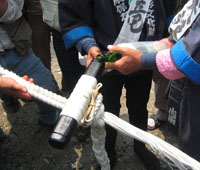 You know how it is when you build a kite that's bigger than your house and weighs about a ton: on the big day you're set to fly it, it rains, right? It's always the way. So you postpone the big day till next week. And because in the case of which I speak your giant kite is made of bamboo and rice paper, watercolored in painstaking detail with symbols of flight and wind and power, you can't just leave it out in the rain, you've got to store it somewhere - somewhere big - but nothing's so big in Japan that's also empty, so you throw a couple dozen tarps over your kite and wait till next week.
You know how it is when you build a kite that's bigger than your house and weighs about a ton: on the big day you're set to fly it, it rains, right? It's always the way. So you postpone the big day till next week. And because in the case of which I speak your giant kite is made of bamboo and rice paper, watercolored in painstaking detail with symbols of flight and wind and power, you can't just leave it out in the rain, you've got to store it somewhere - somewhere big - but nothing's so big in Japan that's also empty, so you throw a couple dozen tarps over your kite and wait till next week. And as is also always the way, next week's big day dawns blue and bright, with puffy clouds just hanging there, like popcorn on a string, in the kitist's anathema: still air. That is, air in which the motion of one's own breath is impressive. So when we arrived late in Yokkaichi for the big festival (postponed last week by rain), it didn't matter: at kite takeoff time there was barely enough wind to lift a tiny paper tissue kite above eye level if several folks blew upward.
And as is also always the way, next week's big day dawns blue and bright, with puffy clouds just hanging there, like popcorn on a string, in the kitist's anathema: still air. That is, air in which the motion of one's own breath is impressive. So when we arrived late in Yokkaichi for the big festival (postponed last week by rain), it didn't matter: at kite takeoff time there was barely enough wind to lift a tiny paper tissue kite above eye level if several folks blew upward.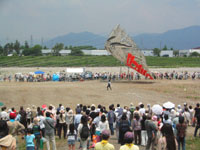 In quest of a breeze it took a few hours of massively collective waiting and mob-shifting the huge kite from one direction to another and back again in the dry part of the wide riverbed, but at last in the afternoon the big kite took off, to the sound of an immense sigh from the crowd that seemed to lift the kite a bit higher. I've never seen so many kites or kite fanatics in one place before. It's a great thing to know that so many love what I used to misguidedly think of as a kid's toy. It was a pleasure to stand corrected among them and watch them at their art.
In quest of a breeze it took a few hours of massively collective waiting and mob-shifting the huge kite from one direction to another and back again in the dry part of the wide riverbed, but at last in the afternoon the big kite took off, to the sound of an immense sigh from the crowd that seemed to lift the kite a bit higher. I've never seen so many kites or kite fanatics in one place before. It's a great thing to know that so many love what I used to misguidedly think of as a kid's toy. It was a pleasure to stand corrected among them and watch them at their art. 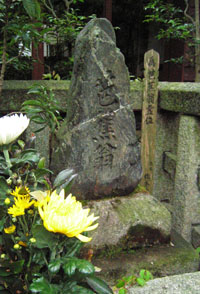 It was no mystery that Basho, at the end of a life spent wandering in pursuit of plain and humble beauty, chose as his resting place this small, quiet temple that perfectly manifests the principle of
It was no mystery that Basho, at the end of a life spent wandering in pursuit of plain and humble beauty, chose as his resting place this small, quiet temple that perfectly manifests the principle of  So there they lie, side by side: the tragic, vainglorious, multiply betrayed warrior and the simple, reclusive wandering poet, in precincts dotted with many haiku-carved stones - placed there by Basho's students and admirers over the centuries - and the grave stone of Kiso's Kyoto mistress over there in the corner (she killed herself upon hearing Kiso had been slain; Kiso's wife was forced to marry into the victorious side of the Minamoto clan, later became a mendicant nun and returned to Nagano in her final days...
So there they lie, side by side: the tragic, vainglorious, multiply betrayed warrior and the simple, reclusive wandering poet, in precincts dotted with many haiku-carved stones - placed there by Basho's students and admirers over the centuries - and the grave stone of Kiso's Kyoto mistress over there in the corner (she killed herself upon hearing Kiso had been slain; Kiso's wife was forced to marry into the victorious side of the Minamoto clan, later became a mendicant nun and returned to Nagano in her final days...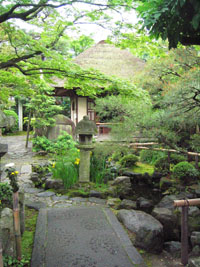 After our visit to Ishiyamadera we went looking for Basho's grave, which I'd been surprised to learn was in Otsu (where Basho spent lot of time) and had since wanted to visit. In our fully intact expedition naivete we didn't need a map, of course; who would need a map to find the small-town grave of Japan's most famous poet and the whole world's haiku master?
After our visit to Ishiyamadera we went looking for Basho's grave, which I'd been surprised to learn was in Otsu (where Basho spent lot of time) and had since wanted to visit. In our fully intact expedition naivete we didn't need a map, of course; who would need a map to find the small-town grave of Japan's most famous poet and the whole world's haiku master?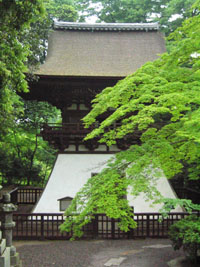 Went in the rain to Ishiyamadera and realized anew, in all that wet and verdant beauty arranged along the mountainside, the deep truth of
Went in the rain to Ishiyamadera and realized anew, in all that wet and verdant beauty arranged along the mountainside, the deep truth of 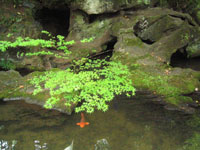
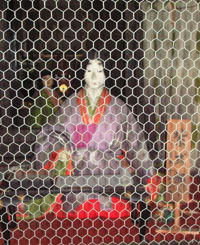 in one of which Basho himself stayed awhile,
in one of which Basho himself stayed awhile,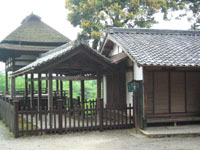 no doubt enjoying what must have been a fantastic Seto-river-and-moon-viewing and haiku-writing platform back in the Basho days.
no doubt enjoying what must have been a fantastic Seto-river-and-moon-viewing and haiku-writing platform back in the Basho days.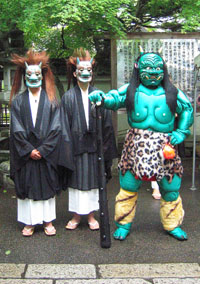

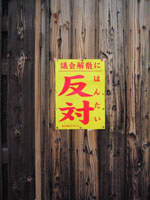 Despite the fact that
Despite the fact that 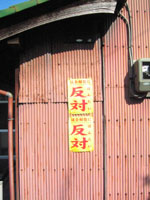
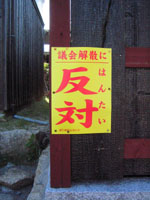 You'd think something would have been learned by now, but general licensed depredation of all that is natural and genuine - for the particular advantage of a select few - seems to be the way of history, at least in the short term, though no short term has ever been as potentially deadly as the one we're now living through.
You'd think something would have been learned by now, but general licensed depredation of all that is natural and genuine - for the particular advantage of a select few - seems to be the way of history, at least in the short term, though no short term has ever been as potentially deadly as the one we're now living through.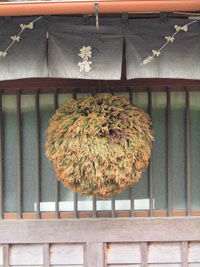 Two months ago at about this time I went to Takashima up the road along the Lake and visited '
Two months ago at about this time I went to Takashima up the road along the Lake and visited ' On Sunday's beautiful morning we went north to our favorite kiddy beach just south of Matsu-no-ura, where there's a long narrow shaded lawn with gazebo and table right beside the sandy stretch of beach that segues into Matsu-no-ura proper (just go north along the beach shore road that starts at Horai and take a right at the police box, then a left; park close by the stone wall). You gotta get there early though in beach season, which we can do since we live only 5 minutes away.
On Sunday's beautiful morning we went north to our favorite kiddy beach just south of Matsu-no-ura, where there's a long narrow shaded lawn with gazebo and table right beside the sandy stretch of beach that segues into Matsu-no-ura proper (just go north along the beach shore road that starts at Horai and take a right at the police box, then a left; park close by the stone wall). You gotta get there early though in beach season, which we can do since we live only 5 minutes away.